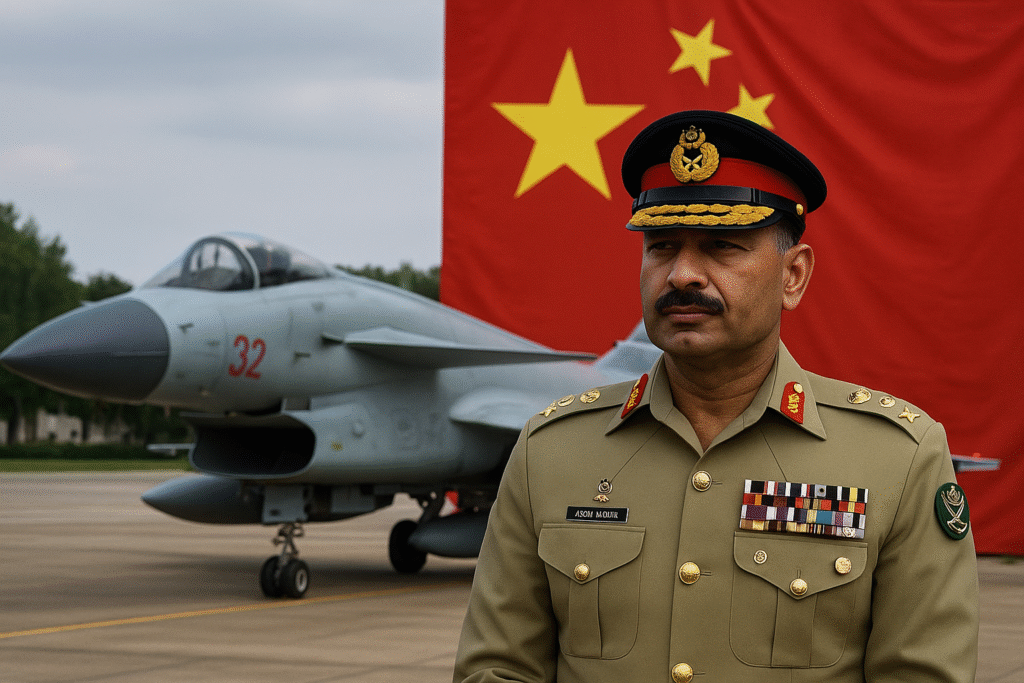BEIJING / ISLAMABAD – Pakistan’s Chief of Army Staff, Field Marshal Asim Munir, recently concluded a high-profile visit to China where he met with the country’s top political and military leaders. The discussions revolved around enhancing defense cooperation, modernizing military capabilities, and addressing regional security threats.
The Pakistani military confirmed the visit in a statement on Friday, emphasizing that these engagements focused on building long-term strategic synergy between Islamabad and Beijing. The meetings come at a time of rising tensions in South Asia following a four-day military standoff between India and Pakistan—the most serious conflict in over two decades.
Pakistan Declares Victory in Military Clash with India
In the recent conflict, Pakistan claimed a decisive victory, reporting that its Air Force successfully downed six Indian fighter jets—three of which were advanced Rafale aircraft—using Chinese-supplied J-10C jets. Pakistan’s army also reportedly struck several Indian military bases in response to aggression along the Line of Control.
Meanwhile, India is responding by ramping up its drone capabilities. According to Reuters, New Delhi plans to introduce a $234 million incentive program for domestic drone production, aiming to cut reliance on foreign imports and match Pakistan’s drone capabilities—largely built with support from China and Turkiye.
Strengthening Pakistan-China Defense Partnership
During Field Marshal Munir’s visit, he held key meetings with:
- Vice President Han Zheng
- Foreign Minister Wang Yi
- General Zhang Youxia – Vice Chairman, Central Military Commission
- General Chen Hui – Political Commissar, PLA Army
- Lt. Gen. Cai Zhai Jun – Chief of Staff, PLA Army
The Pakistani military’s Inter-Services Public Relations (ISPR) stated, “Both sides discussed joint military training, counterterrorism strategies, defense technology transfers, and enhanced institutional cooperation.”
Field Marshal Munir was also presented with a guard of honor upon his arrival at the PLA Army Headquarters—symbolizing the historic military camaraderie between the two nations.
Regional Security and CPEC: Key Points of Discussion
Conversations during the visit also touched on the broader regional and global political environment, particularly:
- The evolving security challenges across South Asia
- Joint responses to hybrid and transnational threats
- Updates on the China-Pakistan Economic Corridor (CPEC)
- Multilateral cooperation and economic connectivity
The Chinese leadership reaffirmed their “full confidence” in Pakistan’s military strength and its stabilizing role in the region. They also emphasized the importance of “strategic coordination” to secure long-term peace in Asia.
China’s Role in Pakistan’s Military Modernization
China remains Pakistan’s largest defense supplier. Over the last five years, 81% of Pakistan’s arms imports have come from China, according to the Stockholm International Peace Research Institute (SIPRI). These include:
- Fighter aircraft
- Missiles
- Radars
- Advanced air defense systems
Some of these technologies have been co-developed or locally manufactured in Pakistan through joint ventures, highlighting the deepening defense-industrial collaboration.
Under President Xi Jinping, China has heavily invested in modernizing its military, and this push extends to its closest ally—Pakistan. Beijing also continues to pour over $60 billion into infrastructure and energy projects in Pakistan under the CPEC framework.
India-China Rivalry and Regional Dynamics
India and China, both nuclear powers and regional giants, remain locked in a decades-long border dispute across the 3,800-kilometer Himalayan frontier. Their rivalry adds complexity to South Asia’s geopolitical landscape, where alliances like the Pakistan-China bond play a significant counterbalancing role.Conclusion: Reinforcing an “Ironclad” Alliance
Field Marshal Asim Munir’s visit once again confirmed the “ironclad strategic partnership” between Pakistan and China. Both sides expressed satisfaction over their defense cooperation and reiterated a commitment to sovereign equality, mutual respect, and regional stability.
“The growing depth of political and military ties reflects the shared vision of peace, resilience, and mutual progress,” the ISPR concluded.
Key SEO Tags:
- Pakistan China military partnership
- Field Marshal Asim Munir China visit
- Pakistan India military conflict 2025
- CPEC updates 2025
- Pakistan air force J-10C jets
- China Pakistan defense cooperation
- India drone development 2025
- South Asia military tensions
- Chinese weapons in Pakistan
- China-Pakistan Economic Corridor news
